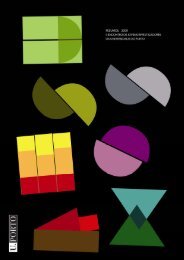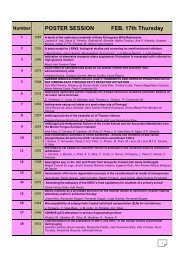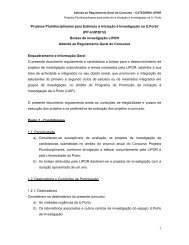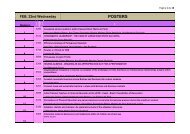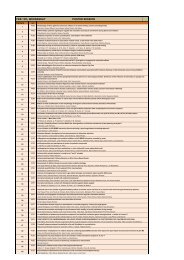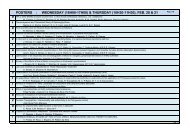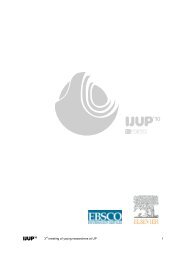IJUP08 - Universidade do Porto
IJUP08 - Universidade do Porto
IJUP08 - Universidade do Porto
- TAGS
- universidade
- porto
- ijup.up.pt
Create successful ePaper yourself
Turn your PDF publications into a flip-book with our unique Google optimized e-Paper software.
P-cadherin: role in breast cancer cell migration and invasion<br />
Ribeiro AS 1 , Paredes J 1,2 , Correia AL 2 , Schmitt F 1,2<br />
1 IPATIMUP, Institute of pathology and molecular immunology from University of <strong>Porto</strong>;<br />
2 School for Health and Sciences, Minho University<br />
Cadherins are calcium-dependent glycoproteins that mediate cell-cell adhesion, presenting<br />
a characteristic pattern of distribution in human tissues. In mammary gland, P-cadherin is<br />
only expressed in myoepithelial cells; however, its expression has been reported in breast<br />
carcinomas, where it is associated with high-grade histological tumours and with poor<br />
patient survival [1-3].<br />
In order to elucidate the role of P-cadherin in breast cancer progression, we aimed to<br />
clarify the capabilities acquired by breast cancer cells, such as motility, migration and<br />
invasion, using as a model a breast cancer cell line (MCF-7/AZ) which was retrovirally<br />
transduced with human P-cadherin (MCF-7/AZ.Pcad).<br />
Using a wound healing assay, we demonstrated that P-cadherin overexpression was able to<br />
promote breast cancer cell migration, which was suppressed by a blocking antibody against<br />
this protein. Also cell motility, measured by time-lapse microscopy, was increased, and it<br />
was strongly associated with the formation of actin filopodia and lamellipodia, whereas its<br />
siRNA-specific silencing reduced the presence of these membrane protrusions.<br />
Besides our group has shown previously, that P-cadherin overexpression in breast cancer<br />
cells promotes in vitro cell invasion [4], in the present study we proved that this effect is Pcadherin<br />
specific, since invasion was decreased to basal levels upon the inhibition of this<br />
molecule. We then considered that this effect could be due to proteases secretion to the<br />
medium, and in fact MMP-1 and MMP-2 activity and expression showed to be increased in<br />
MCF-7/AZ.Pcad cells, as well as a soluble P-cadherin fragment. Furthermore, when<br />
parental cells where treated with the conditioned medium recovered from P-cadherin<br />
overexpressing cells, cell invasion was promoted, implying that MCF-7/AZ.Pcad cells<br />
secrete proteins to the medium that should be involved and facilitate cell invasion.<br />
Taken together, this work presents, a possible cellular mechanism explaining why Pcadherin<br />
expression is associated with a more aggressive phenotype and a poor patient<br />
survival in breast carcinomas.<br />
References<br />
[1] Paredes J, Milanezi F, Viegas L, Amen<strong>do</strong>eira I, Schmitt FC (2002), P-cadherin expression<br />
is associated with high-grade ductal carcinoma in situ of the breast, Virchows Arch 440:<br />
16-21, 2002<br />
[2] Paredes J, Milanezi F, Viegas L, Amen<strong>do</strong>eira I, Schmitt FC (2002), P-cadherin expression<br />
is associated with high-grade ductal carcinoma in situ of the breast, Virchows Arch 440:<br />
16-21, 2002<br />
[3] Paredes J, Albergaria A, Oliveira JT, Jerónimo C, Milanezi F, Schmitt FC (2005), Pcadherin<br />
overexpression is an indicator of clinical outcome in invasive breast carcinomas<br />
and is associated with CDH3 promoter hypomethylation, Clin Cancer Res 11: 5869-5877,<br />
2005<br />
[4] Paredes J, Stove C, Stove V, Milanezi F, Van Marck V, Derycke L, Mareel M, Bracke M,<br />
Schmitt F (2004), P-cadherin is upregulated by ICI 182,780 in breast cancer cells and<br />
promotes invasion via its juxtamembrane <strong>do</strong>main, Cancer Res 64: 8309-8317, 2004.<br />
67




